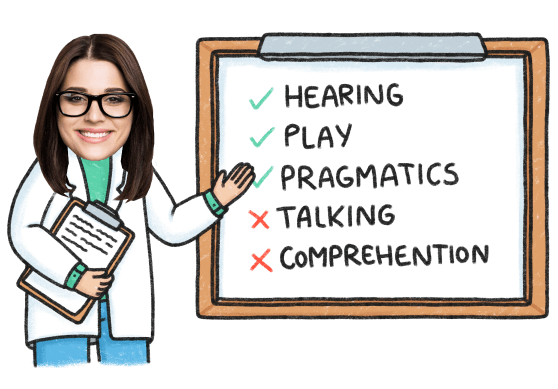How to Improve Reading Comprehension, Fluency, and Speech Production
Feb 5, 2022 As a speech language pathologist (and parent), I am keenly aware of the importance of exposing our children to a language-rich environment.
Reading comprehension and fluency can have many positive effects, such as:
- Increasing speech production
- Improving receptive language
- Growing vocabulary
- Improving social skills (e.g. turn-taking)
Growing Vocabulary with Speech Blubs
Speech Blubs is a great way to teach new words to your child. Start your free trial today and explore engaging activities your child will love and benefit from.
Boost Your Child’s Speech Development!
Improve language & communication skills with fun learning!

In my private practice, the majority of the children that I see have articulation disorders (difficulty producing sounds), issues with comprehension, and slow reading fluency. This has been the primary focus of my career when working with school-aged children.

One of the main ways that I target all of these goals into one therapy session is by using books. What I’ve found is that, when using stories, not only does a child’s speech production improve but so does his/her literacy skills.
What a Challenge
Helping kids improve their literacy skills can be quite a challenge. My brother had a vast range of learning disabilities growing up, one of which was dyslexia, so I know the struggles and frustrations that go along with reading difficulties. Oftentimes, these issues go undiagnosed for quite a while, and parents are left to wonder why homework is such a difficult time!
Reading Fluency
When working on reading fluency, most teachers will say go home and read the first 100 words over and over. Well . . . if your child has difficulty reading, this can be extremely frustrating for them . . . and you!
When I practice speech activities with my clients, I have them repeat the words in chunks. This means I break up the list into maybe 10 words at a time. For that first session, we work on breaking down the word into each sound, syllable, and then finding it in paragraphs.
Once they are ok with this, we work on synonyms (words that mean the same thing), antonyms (words that are the opposite), and pair the word with pictures so that they have a visual aid when taking quizzes and tests.
If your child is overwhelmed with 10 words, it’s ok to simplify that list down to five words. The school district, as long as there is an IEP in place, must accommodate learning disabilities.
Reading Comprehension
There’s a lot that goes into reading comprehension. A child must be able to:
- Decode words
- Pronounce the words
- Understand the words
- Reproduce the words
If any one of these areas breaks down, the following steps are interrupted. When working on reading comprehension, the best way to target improvement is to make sure your child can retell small details from what you are reading, sequence what happened first, second, or third, answer “wh” questions (“what did the boy find in the forest?”), and be able to talk about the story, such as making predictions.
You can target all of these skills by reading WITH your child. Ask them questions as you go along. Make sure they are able to tell you what the characters are doing or where they are going. The older they get, the more complicated the questions can become.
Don’t worry if your child isn’t a huge fan of reading. You can always use another great resource, Speech Blubs. The app can work on all of the above-mentioned skills in a fun and interesting way! It’s engaging, interesting, and keeps kids engaged the entire time they are working on speech and language skills!

